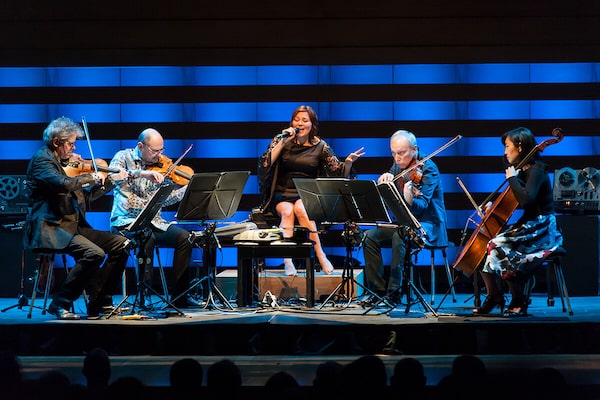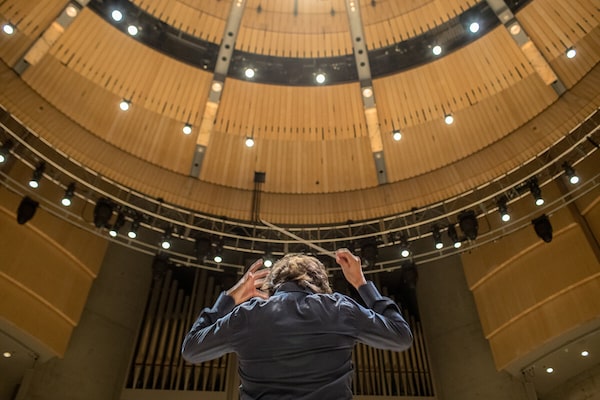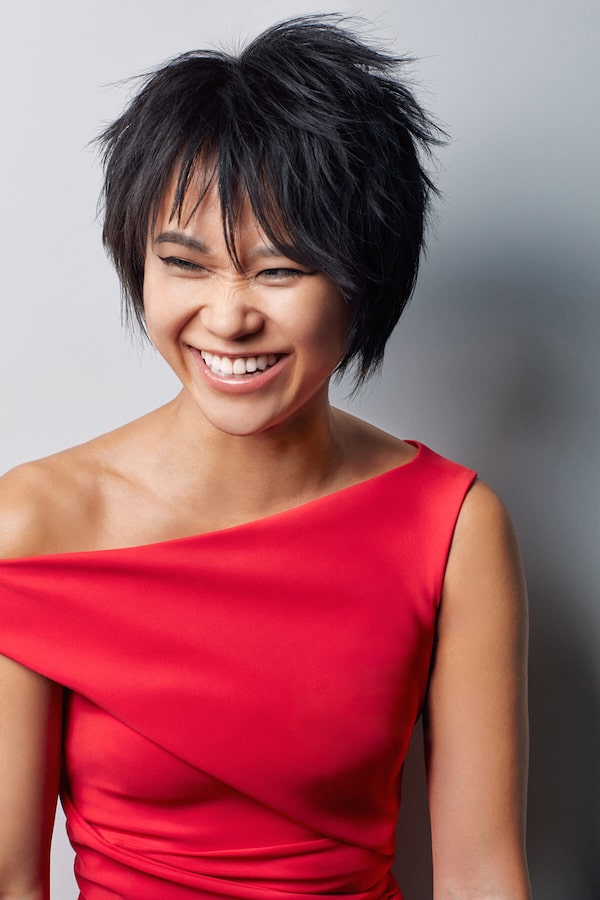
The Kronos Quartet will play three shows in December at the Royal Conservatory of Music’s Koerner Hall, including a major concert on Dec. 9 with Inuk throat singer Tanya Tagaq.LISA SAKULENSKY
There’s a lot of history on Toronto’s classical stages this fall. The Toronto Symphony Orchestra is celebrating its 100th anniversary with many of its most beloved works and artists. Opera Atelier is bringing back one of its “greatest hits,” which helped launch the company more than 35 years ago. The Royal Conservatory of Music is hosting such established audience favourites as Russian piano virtuoso Daniil Trifonov and the Kronos Quartet.
It won’t just be an exercise in nostalgia, however. Along with the pleasure of the familiar, there will also be – to tweak a famous phrase of critic Robert Hughes – the thrill of the new.
That’s evident in the TSO’s centenary programming, where both often go hand in hand.
“A 100th anniversary is a good point to stop and both look back at the past and look to the future,” says TSO music director Gustavo Gimeno. “And we live in times where integration is more important than separation, so I wanted to integrate some of those wonderful blockbusters of the repertoire with new creations.”
Gimeno also wants to show how the new is informed by the old. In October, he’s conducting a concert in which esteemed pianist Yefim Bronfman, who made his TSO debut in 1981, is playing Beethoven’s Piano Concerto No. 3 – the most-performed of the Beethoven piano concerti in the TSO’s history. But the same program (Oct. 12, 14, 15) also sees the Canadian premiere of prize-winning Korean composer Unsuk Chin’s subito con forza, a work that riffs on Beethoven’s Coriolan Overture.

Toronto Symphony Orchestra maestro Gustavo Gimeno strikes up the music in Roy Thomson Hall.CHRISTOPHER WAHL
Bronfman is one of the many veteran artists associated with the TSO’s past who are returning to celebrate. Others include legendary cellist Yo-Yo Ma, who is headlining a sold-out Nov. 16 gala, and former maestro Peter Oundjian, who’ll be conducting Holst’s ever popular The Planets (Nov. 9-12). There will also be more recent favourites, such as Chinese piano superstar Yuja Wang, who is back to perform the Canadian premiere of Finnish composer Magnus Lindberg’s new Piano Concerto No. 3 (Oct. 20-22).
We live in times where integration is more important than separation.
— Gustavo Gimeno, Music director, Toronto Symphony Orchestra
“She’s an amazing artist who the Toronto audience loves, and by coincidence she’s the soloist I’ve performed the most with,” Gimeno says, noting that he’s conducted her performances for the Luxembourg Philharmonic – which he also helms – and many other orchestras. “It will be a happy reunion.”
Those masters of the Baroque, Opera Atelier, are also drawing on their past to open the new season. Henry Purcell’s Dido and Aeneas, the 17th-century British opera that has become one of the company’s signature works, is being revived at the Elgin Theatre (Oct. 20-23). But here again, the old bumps against the new, with Meghan Lindsay and Colin Ainsworth playing the titular lovers for the first time, while stellar soprano Measha Brueggergosman-Lee takes her first crack at the role of the evil Sorceress.

Chinese pianist Yuja Wang performs with the TSO Oct. 20-22.Supplied
“It’s just one of these wonderful coincidences,” says Marshall Pynkoski, who shares artistic directorship of OA with choreographer Jeannette Lajeunesse Zingg. The two first staged Dido in 1986 at the Royal Ontario Museum “as an experiment,” he recalls. The company has since revived it many times and toured it to the U.S., the U.K., Europe, Singapore and South Korea. “It never pales,” Pynkoski says. “Every time you come back to it, there is something new that you discover in it because of the artists who are interpreting it.”
He also calls it perfect entry-level opera: It’s sung in English, only one-hour long and combines a classic tragic love story (based on Virgil’s Aeneid) with the raucous comedy of its Shakespearean witches. “It really is the ultimate family show if people want to introduce their children or their grandchildren to opera,” Pynkoski says, pointing out that Purcell originally wrote the piece to be performed by a girls’ school.
Mervon Mehta, executive director of performing arts at the Royal Conservatory of Music, knows about balancing the old and new. For the RCM’s 14th season of programming at Koerner Hall, he’s bringing in both familiar faves like Trifonov and Kronos, but also musicians making their Koerner debut.
“We’re always looking for new artists, older artists doing new material, and introducing especially BIPOC artists,” Mehta says.
Fall highlights include the Grammy-winning, New York-based Orpheus Chamber Orchestra, making its first Koerner appearance in a concert with popular young Canadian pianist Jan Lisiecki (Oct. 15), and renowned Turkish pianist Fazil Say in his first solo recital at the hall (Nov. 6). Celebrated Israeli violinist Maxim Vengerov also plays there for the first time on Oct. 22.
Trifonov, meanwhile, is back on Dec. 2 to dazzle with a recital of works by Tchaikovsky, Schumann, Mozart, Ravel and Scriabin. “He’s been here at least five times now and he never ceases to amaze the audience,” Mehta says.
New-music champions Kronos Quartet are playing three shows in December, including a major concert on Dec. 9 with the ineffable Inuk throat singer Tanya Tagaq. Called Music for Change, it’s a civil rights-themed program that Mehta describes as “a call to action through contemporary classical music.”
Advertising feature produced by Globe Content Studio. The Globe’s editorial department was not involved.